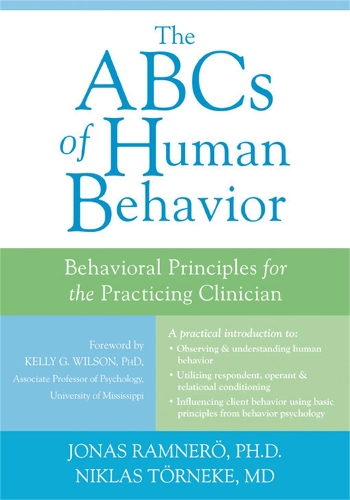
The ABCs of Human Behavior: Behavioral Principles for the Practicing Clinician
(Paperback)
Publishing Details
The ABCs of Human Behavior: Behavioral Principles for the Practicing Clinician
By (Author) Dr. Niklas Trneke
New Harbinger Publications
New Harbinger Publications
7th July 2011
7th July 2011
United States
Classifications
General
Non Fiction
Abnormal psychology
616.89
Physical Properties
Paperback
240
Width 178mm, Height 252mm, Spine 18mm
416g
Description
When cognitive behavior therapy emerged in 1950s, driven by the work of Albert Ellis and Aaron Beck, basic behavior principles were largely sidelined in clinical psychology curricula. Issues in cognition became the focus of case conceptualization and intervention planning for most therapists. But as the new third-wave behavior therapies begin to address weaknesses in the traditional cognitive behavioral models-principally the modest effectiveness of thought stopping and cognitive restructuring techniques-basic behavior principles are once again attracting the interest of front-line clinicians. Many of today's clinicians, though, received their training during the years in which classical behaviorism was not a major part of clinical education. In order to make the best use of the new contextual behaviorism, they need to revisit basic behavioral principles from a practical angle. This book addresses this need.
Reviews
"Along with the explosion of interest in newer psychotherapies such as ACT, behavioral activation, DBT, FAP, and mindfulness/acceptance/meditation based interventions, many clinicians who were not extensively trained in behaviorism want a deeper understanding of the fundamental behavioral processes and theory that that underlie these treatments. Up to now, this basic information was buried and dispersed in an array of textbooks, philosophical and theoretical treatises, and an extensive laboratory-based experimental literature. Ramner and Trneke have distilled the essentials of this (often) esoteric literature in a clearly written, comprehensive, up-to-date book that frequently illustrates the abstract principles with clinical applications. Operant conditioning, respondent conditioning, exteroceptive conditioning, stimulus control, establishing operation, functional analysis, relational framing, negative versus positive reinforcement, are a just a few examples of the concepts that are demystified, made understandable, and clinically relevant. The book is an ideal basic text for graduate students learning about behavioral psychotherapy (the author's name for the new treatments mentioned above) and will fulfill the needs the experienced clinician who wants a deeper understanding of these therapies."
--Robert J. Kohlenberg, professor of psychology at the University of Washington
"It is rare to find a book on behavioral analysis that successfully incorporates theory and clinical utility. The ABCS of Human Behavior does, indeed, succeed. Ramner and Trneke provide the reader with a concise description of ideas dating back to Skinner as well as more recent treatments of such complex issues as understanding cognition. This engaging book will provide scholarly and practical information that is a must read for clinicians and students from all theoretical backgrounds."
--Christopher R. Martell, Ph.D., ABPP, clinical associate professor of psychiatry and behavioral sciences and psychology at the University of Washington and author of Depression in Context
"The authors combine advanced discussions about learning theory and behavioral analysis with straightforward and informative examples. The book also discusses the more recent theoretical developments within the fields of human language and cognition. Both beginners and experienced therapists will find much to learn from reading this book."
--Lennart Melin, Ph.D., professor of clinical psychology at Uppsala University in Uppsala, Sweden
Author Bio
Niklas Trneke, MD, is a psychiatrist and has worked as a senior psychiatrist in the department of general psychiatry in his hometown Kalmar (in the southeast of Sweden) from 1991 until he started private practice 1998. He earned license as a psychotherapist in 1996 and was originally trained as a cognitive therapist. Since 1998 he has worked mainly with acceptance and commitment therapy, both in his own practice and as a teacher and clinical supervisor. His clinical experience ranges from psychiatric disorders such as schizophrenia to common anxiety and mood disorders with high prevalence in the general population.
